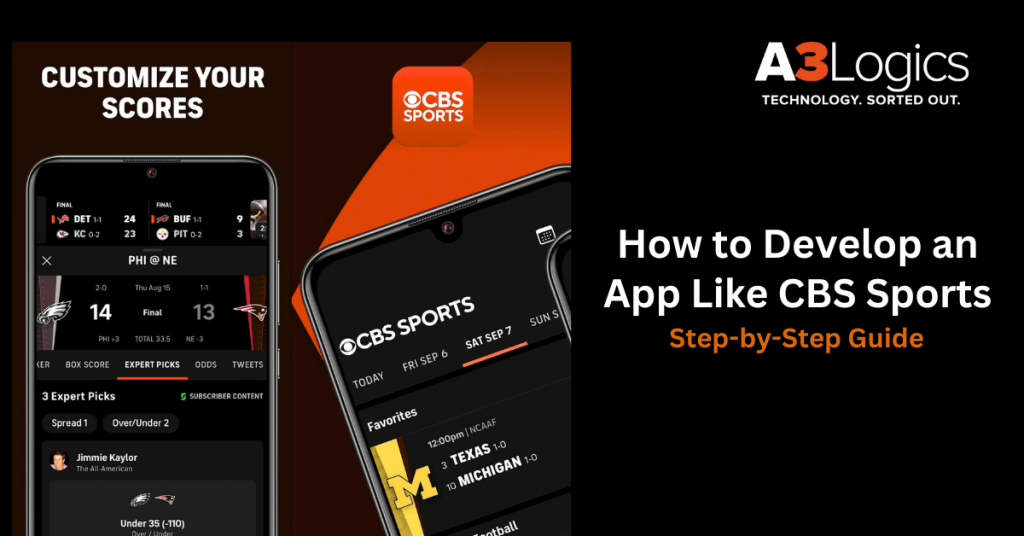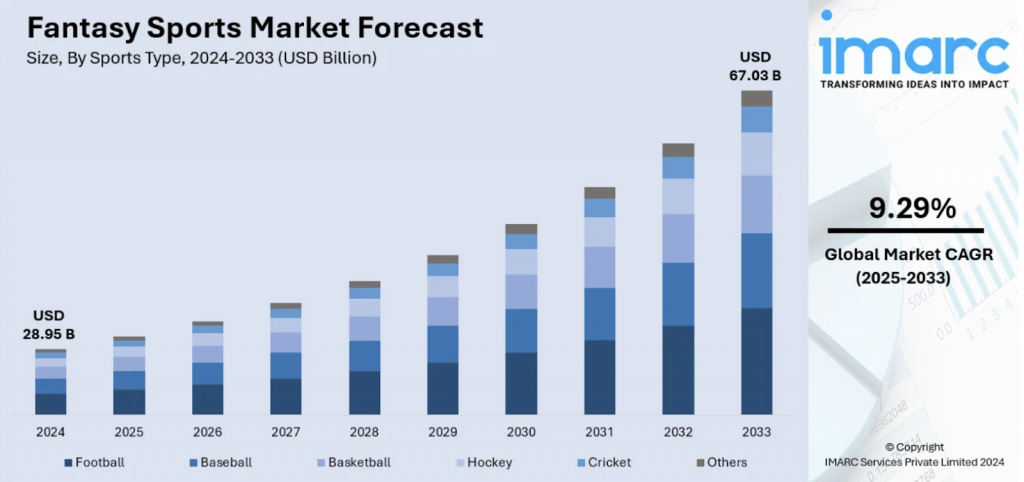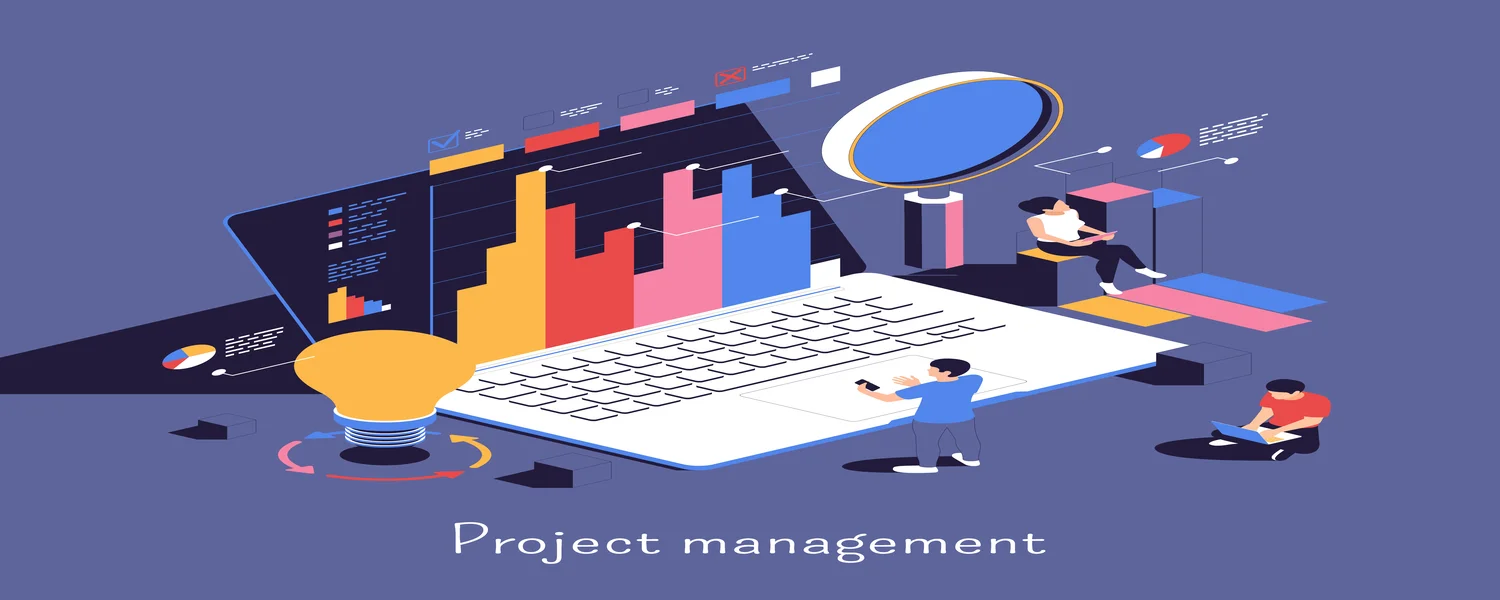The market for fantasy sports apps is expanding quickly due to the increased demand for more interactive sports experiences and the growing popularity of fantasy leagues. These apps serve sports fans of all skill levels by offering social features, player stats, and real-time updates. Given the anticipated rapid growth of this sector, now is an excellent moment to develop an app like CBS sports.

One of the top fantasy sports apps that has established industry standards is CBS Sports. With more than 10 million people downloading the app it has a sizable and devoted user following. Thanks to its – extensive feature set, intuitive design, and dependable performance. The app’s popularity demonstrates the market’s enormous potential for fantasy sports apps.
Startups, companies, and entrepreneurs – who are keen to get into the fantasy sports market have taken notice of the popularity of app like CBS Sports. These apps are a great potential for new developers due to their increasing profitability and popularity.
This blog post offers a comprehensive how-to develop an app like CBS Sports. Market trends, key features, development processes, tech stack requirements, cost considerations, and how to improve your app with AI and ML will all be covered.
Table of Contents
Market Trends in Fantasy Sports App Development

1. Live Score Integrations and Real-Time Analytics
Among the leading fantasy sports app trends is – the integration of live score updates and real-time analytics. Live scores are desired immediately by sports enthusiasts while the action develops. Fantasy sports participants wish to know how players and their own team members perform. Through real-time analytics, fantasy sports apps are in a position to update users with – up-to-date statistics, current player performances, and game scores.
Incorporating real-time score information not only improves the user experience but also provides a competitive advantage by keeping the players interested in the game at all times.
2. Higher User Engagement via Gamification
Another important trend – is the use of gamification elements to boost user engagement. Fantasy sports app like CBS Sports are essentially games; and they thrive on user interaction. To encourage deeper participation, apps incorporate gamified elements like achievements, badges, daily challenges, virtual currencies, and leaderboards.
These gamification practices serve to engage the fantasy sports experience and reward users more interactively, causing a rise in user retention. The more participants are engaged, the higher their likelihood of using the app continuously and taking part in subsequent fantasy leagues.
3. Emerging Role of AI and AR in Sports Apps
Combining Artificial Intelligence (AI) and Augmented Reality (AR) is revolutionizing the way sports apps function. AI can be used for predicting player performances, recommending customization, and chatbots offering live guidance to fantasy managers. AI-based analytics are also used to detect trends and strategies that can be followed by users to enhance their fantasy teams.
Augmented Reality (AR) has the potential to improve the user experience by providing interactive features, like viewing player statistics in 3D or projecting live game information on real-world settings. These technologies are quickly being adopted in the world of sports and can make your fantasy sports app stand out.
4. Growing Global User Base and Market Size
The fantasy sports market is no longer confined to North America. The fantasy sports market worldwide is growing, particularly in places such as Europe, Asia, and Latin America. With the introduction of mobile technology and free internet access, fantasy sports have become widely available.
A scalable application that is able to serve multiple regions, languages, and currencies will be at a competitive advantage in this globalized economy. Knowledge of international sports interests and building localized experiences can assist in reaching these new markets.

Why Build an App Like CBS Sports?
> Opportunity for Market Expansion
The fantasy sports market is booming, with the fantasy sports market expected to grow from USD 36.75 billion in 2025 to reach USD 105.58 billion by 2033, indicating that the industry is poised for substantial expansion. Building an app like CBS Sports gives you the opportunity to tap into this rapidly expanding market. To create an app like CBS Sports with a wide range of sports leagues, personalized features, and real-time updates, you can attract a large and diverse audience of sports fans.
> High User Engagement and Retention
Fantasy sports apps thrive on high levels of engagement, as users frequently log in to check on their teams, update their player line-ups, and track live scores. The key to success in this space is creating an app that keeps users engaged over the long term. Offering compelling features like player stats, real-time data, gamification, and social sharing capabilities can improve user retention.
> Multiple Revenue Streams
Fantasy sports apps offer multiple monetization opportunities. From in-app purchases and subscription models to advertisements, there are several ways to generate revenue. Additionally, you can explore sponsorships from sports brands or partner with other companies to offer exclusive promotions. The diverse revenue streams make building a fantasy sports app a lucrative business opportunity.
> Gain Competitive Edge in Sports Tech
The sports tech industry is highly competitive, and new apps are emerging all the time. However, by incorporating cutting-edge technologies like AI, AR, and real-time data analytics, you can differentiate your app from the competition. Being innovative in the use of emerging technologies can give you a significant competitive advantage.
> Scalable Global Reach
As the demand for fantasy sports continues to grow globally, to develop an app like CBS Sports ensures you can expand to new markets with ease. A robust infrastructure and the ability to localize the app for different languages and regions will allow you to cater to a wider audience, increasing your chances of success.
How Does the CBS Sports App Work?
1: Register and Log in
Without first making an account, users are unable to use the app. They can therefore enter their name, address, and other information that may be useful in building a profile under this phase.
2: Picking Leagues and Sports
There are now options for users to choose the kind of game they wish to play and the league in which they can play.
The application has the ability to recommend suitable games that align with the user’s preferences.
3: Establishing Teams
Users can create a team and choose the players. Here, the team captain can be chosen depending on how well the players perform on the field.
Furthermore, based on their prior performance in the game, users ought to be requested to lead a squad or serve as a manager.
4: Accumulating Points
Depending on their performance and strategy, individuals can earn reward points when playing fantasy sports. Users are encouraged to keep playing the game by these points.
Users will benefit from these incentives as they improve their overall performance and develop a strong portfolio.
5: Evaluation and Input
Users can evaluate and comment on the app based on their gaming experiences. The app’s defects and mistakes will be lessened thanks to these reviews. It will help you improve your game experience for more sports.

Key Features of the CBS Sports App
1. Personalized Team and League Features
Provide users with an ability to develop customized fantasy teams with various degrees of customization, including the means to define rules for a league, draft fantasy players, and assign player positions. Fantasy team flexibility provides users with control of their gameplay process.
2. Real-Time Scoring and Game Updates
Real-time updates are paramount for a fantasy sports application. Users need to follow their team’s performance in real time. Real-time scoring, match updates, and player statistics are crucial to keeping users engaged and up to date.
3. Push Notifications for Live Events
Push notifications are a strong feature to notify users about significant events like game commencements, match results, player injuries, or transfer news. Custom notifications can keep users interested and come back to the app for fresh updates.
4. Leaderboards, Rewards & Rankings
Leaderboards are crucial in building a competitive environment. Users like to know how they rank in comparison to others in the league. Providing rewards and ranking systems based on performance can encourage users to remain competitive and active.
5. Social Media Sharing Capabilities
The incorporation of social media share features enables the sharing of users’ fantasy victories, stats, and ranks to their friends and followers. It can help gain more exposure for the app and bring in new users, particularly when people post their accomplishments on Facebook, Twitter, and Instagram.
5. Data Analytics for Player and Team Insights
Offering data-driven information regarding player performance, team statistics, and future match predictions can assist users in making informed choices while handling their fantasy teams. AI-powered analytics-based tools can offer recommendations on how to enhance the performance of a team.
6. Secure In-App Transactions
Secure payment processing must be ensured. If your app includes paid functionalities, in-app purchases, or tournaments, adding a secure payment gateway such as PayPal or Stripe will make users feel secure while paying.
7. Integration of Augmented Reality (AR)
Augmented reality can be used to better the user experience by projecting real-time live data or player statistics. For instance, you might develop an AR feature through which users can hold up their phone in front of a screen to view player or team statistics in detail.
Steps to Create an App Like CBS Sports
Step 1: Define Your Value Proposition
Before you develop an app like CBS Sports, define your app’s unique value that it will provide. Are you targeting specific sports, providing unique features, or are you after a niche audience? Your value proposition must differ from others and draw users right from day one.
Step 2: Create a Minimum Viable Product (MVP)
Creating an MVP is important in the initial phases. Prioritize essential features that are required for functionality (such as player selection, scoring, and real-time updates) and test the app with actual users to gain feedback. The MVP helps you iterate and enhance the app before scaling completely.
Step 3: Select the Appropriate Platform (iOS, Android, Cross-Platform)
Choosing to create an app like CBS Sports for iOS, Android, or both will be an important decision. If you’re aiming for a huge user base, building a cross-platform app may be more budget-friendly, whereas platform-specific apps may provide better performance.
Step 4: Design an Intuitive and Engaging UI/UX
User interface (UI) and user experience (UX) design is crucial to retain users. Your app must be intuitive, easy to use, and aesthetically pleasing. Be mindful of details such as layout, icons, fonts, and colors for a smooth experience.
Step 5: Choose the Perfect Tech Stack
The selection of the proper tech stack will determine the performance, scalability, and security of the app. To develop an app like CBS Sports, you can implement APIs for live data, utilize AI tools for analytics, and leverage frameworks such as React Native or Flutter for cross-platform development. The back-end would be strong, possibly leveraging technologies such as Node.js, Python, or Ruby on Rails for scalability and real-time data processing. For secure and user data, use HTTPS, SSL, and databases like PostgreSQL or MongoDB.
Step 6: Create Front-End and Back-End Modules
Having both the front-end and back-end modules developed is a key step. The front-end addresses the user interface and experience, whereas the back-end deals with data processing, server management, and with external APIs integration (e.g., for live scores, players’ stats, etc.). Having a modular design, wherein the front-end and back-end are developed in parallel, promotes efficient development and rapid iterations.
Step 7: Conduct Rigorous Testing
Test the app across platforms to verify that it operates smoothly on both iOS and Android platforms. Additionally, test the app to make sure it performs well on different screen sizes and resolutions.
Step 8: Launch, Monitor, and Maintain the App
After launch, monitor the app’s performance at all times to detect any bugs, crashes, or performance bottlenecks. Update the app regularly to incorporate new features, enhance user experience, and eliminate issues. The use of continuous monitoring tools, such as Google Analytics, will enable you to monitor user behavior and app performance.
Key Technologies to Consider
> AI and Machine Learning for Player Analytics
Infusing AI and machine learning technologies while you create an app like CBS Sports can give users customized recommendations, game forecasts, and analysis of player and team performance. Machine learning models can be trained on large amounts of data to forecast player form, match results, and possible injuries, giving fantasy managers data-driven advice. AI chatbots could help offer users real-time guidance on their fantasy teams.
> Real-Time Game Data Visualization Tools
Live data visualization is imperative to create an app like CBS Sports. Users anticipate that live stats, player performance metrics, and game scores be live-updated. Libraries such as WebSocket, Firebase, or any other real-time data platforms enable you to embed live data feeds into your application seamlessly. Using interactive data visualization libraries (such as D3.js) also helps to present data in an aesthetically pleasing and comprehendible way.
> Personalized Recommendations and AI Chatbots
Personalization is the key to user satisfaction. AI algorithms can analyze users’ past decisions and interactions to suggest players, strategies, or even the best team line-ups. AI-powered chatbots can also improve the experience of users by offering real-time advice and helping with the management of teams.
> Blockchain for Secure Payments and In-App Currency
The Blockchain technology is becoming increasingly popular to develop an app like CBS Sports, especially for safe in-app transactions. Blockchain can be applied to fantasy leagues’ currency (such as tokens or coins) and transactions to make them transparent, secure, and tamper-proof. Blockchain also facilitates safe peer-to-peer transactions and minimizes the risk of fraud, which increases the trust of your user base.
> Augmented Reality (AR) for Enhanced Experience
As discussed above, AR has the ability to provide a new and immersive experience to fantasy sport enthusiasts. Whether by visualizing player stats in 3D, providing AR-based team management, or even taking highlights into real-world settings, AR has the potential to take the user experience to the next level. It can even provide marketing space, such as virtual product placements or team presentations.
> Voice Command Interfaces for App Navigation
Voice commands are becoming very popular in the design of applications, and fantasy sports applications will also find this technology useful to incorporate. The integration of voice command features helps users move through the application faster, access live scores, or control their fantasy teams without manual intervention. Voice interfaces might also give personalized alerts or assist in making fast decisions while watching a live match.

Development Time and Cost Breakdown
Factors Affecting Time and Cost
Several factors can influence the development time and cost of a fantasy sports app. These include:
App Complexity: The more features you add, the more time it will take to develop an app like CBS Sports. For example, integrating live score feeds, real-time analytics, and AI-driven predictions adds complexity to the app.
Design Requirements: Creating an intuitive and engaging UI/UX will require additional design resources, as it involves not just the visual aesthetics but also usability testing.
Technology Stack: The choice of technology stack (e.g., native vs. cross-platform development, use of AR or AI) can impact the cost and time needed for development.
Integration with Third-Party Services: Integrating APIs for live sports data, payments, and social media sharing can affect both time and cost, depending on the complexity and reliability of these services.
| App Complexity | Estimated Timeline | Estimated Cost Range |
| Basic App | 3 to 6 months | $25,000 – $50,000 |
| Medium Complexity App | 6 to 9 months (real-time data, player analytics, basic AI) | $50,000 – $100,000 |
| Highly Complex App | 9 to 12+ months (AI, AR, blockchain, advanced features) | $100,000 – $250,000+ |
Monetization Strategies
In-App Purchases
In-app purchases are one of the most popular ways to monetize fantasy sports apps. These can include buying premium features, unlocking special content, or purchasing virtual items like team upgrades, exclusive players, or extra points.
Subscription Models
Offering a subscription-based model, such as monthly or yearly premium memberships, gives users access to exclusive features, such as enhanced analytics, ad-free experience, or more in-depth player insights. Subscription models can generate consistent and predictable revenue streams.
Advertising and Sponsorships
You can monetize your app through advertising and sponsorships. Display ads or video ads can be shown to users, especially during breaks or after matches. You can also partner with sports brands, teams, or other relevant businesses to offer sponsorship deals.
Data Licensing and Monetization
With the wealth of data that a fantasy sports app generates, you could license it to third parties, such as sports analysts, media outlets, or betting platforms, as a source of revenue.
Community Features and Crowdsourcing
Adding social or community-driven features can help with both engagement and monetization. Crowdsourcing contests, tournaments, or creating a platform for user-driven content can enhance user interaction while offering premium entry fees or entry-level access for a cost.
Why Choose A3Logics to Build Your Fantasy Sports App?
Expertise in Sports App Development
A3Logics has extensive experience to develop an app like CBS Sports. Their team of experts understands the nuances of the sports industry and how to build apps that cater to the needs of fantasy sports players.
Proven Track Record with Scalable Solutions
With a history of delivering scalable solutions, A3Logics ensures your app will perform well under heavy traffic and data loads, giving you the confidence to scale globally as your user base grows.
Focus on Innovation and Emerging Tech
A3Logics emphasizes integrating the latest technologies, such as AI, AR, and real-time data feeds, to develop an app like CBS Sports that stand out from the competition.
End-to-End Development Services
As a Fantasy Sports App Development Company A3Logics offers end-to-end development services, from initial concept and strategy to design, development, testing, and ongoing maintenance, ensuring a smooth and efficient development process.
Conclusion
To develop an app like CBS Sports is a highly promising venture, with numerous opportunities for innovation, engagement, and monetization. By leveraging emerging technologies, offering a seamless user experience, and tapping into global markets, your app can carve out a niche in the competitive world of sports tech.
With the right features, tech stack, and monetization strategies, you can develop an app like CBS Sports that not only attracts users but also keeps them engaged long-term. Whether you’re just starting or looking to upgrade an existing app, following these guidelines and hiring the right Mobile App Development Company will put you on the path to success.





